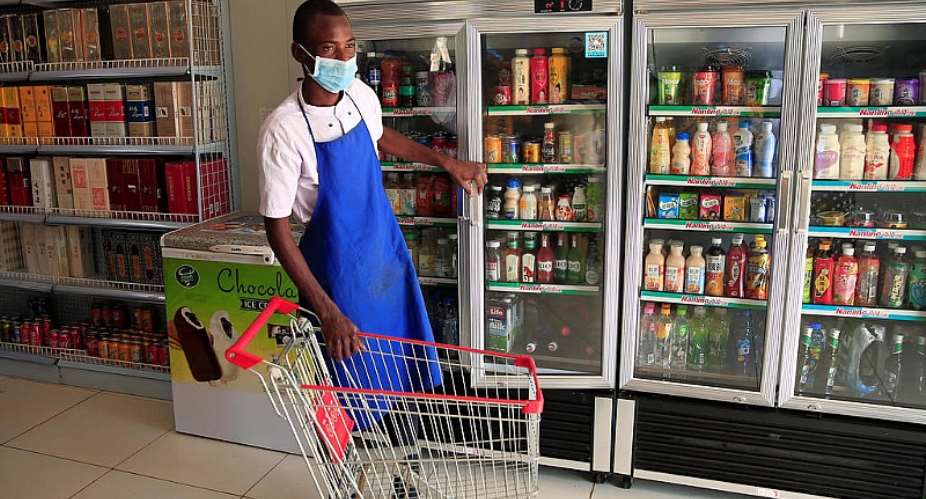Drinkers in Zimbabwe are bracing themselves for a dry weekend after police said they would enforce a ban on the sale of alcohol as part of their efforts to enforce social distancing under a coronavirus lockdown.
“Is there someone trying to incite boozers?” asked journalist Brezh Malaba in a tongue-in-cheek tweet. Zimbabweans have largely obeyed restrictions on outside activity this week though 485 arrests were recorded on Thursday, day four of the curfew.
Homemade cider
On Friday, thirsty Zimbabweans took to swapping recipes on WhatsApp groups for maheu, a local fermented drink, and even for cider.
The ban on alcohol sales took many by surprise, especially as earlier in the week the government designated the main brewer -- Delta Corporation -- as an essential service that could continue operations during the 21-day lockdown.
But police spokesman Paul Nyathi said “action will be taken” against supermarkets and stores selling alcohol.
“We have realised that people who buy alcohol at supermarkets are giving us challenges. They buy and drink as groups, be it either in their vehicles or places of residence thereby defying social distancing,” he said in comments published by the state-run Herald.
Roadblocks and fines
President Emmerson Mnangagwa declared Covid-19 a national disaster on 17 March and the authorities and aid groups are trying to piece together a response plan to the disease, hoping the lockdown will give them the chance to get ahead of the infection curve.
Zimbabwe has so far only recorded nine cases of the coronavirus, one of them fatal.
There's been an increase this week in the number of roadblocks around the capital Harare.
But not all of them are genuine. Residents reported a bogus roadblock set up on Thursday by seven fake police officers who were stopping motorists in the city's affluent Quininngton suburb.
Fines for those arrested at bonafide checkpoints are between seven and 18 euros.
Not keeping their distance
Police have come in for criticism for cramming those arrested onto the back of police trucks with no regard to social distancing.
Amid a serious food shortage, Zimbabweans are also queuing up outside shops when there are rare deliveries of the staple maize meal.
The non-profit group, the Centre for Innovation and Technology tweeted pictures of shoppers queuing Friday outside a supermarket in Tshabalala, a low-income suburb in the second city of Bulawayo.
After poor rains and harvests, the UN on Thursday launched an appeal for 715 million US dollars to fund a Humanitarian Response Plan for the country. The plan aims to support 5.6 million people here with food and other aid, but also to mitigate the impact of Covid-19.
Humanitarian crisis
After severe drought and a prolonged economic crisis, the disease is expected to hit Zimbabwe hard. The International Monetary Fund said Friday that the Covid-19 pandemic had worsened the country's outlook and without scaled-up donor support "the risks of a deep humanitarian crisis are high."
But there is widespread concern over the slow rate of testing; only 316 tests for coronavirus have been conducted so far. Yet more than 13,000 Zimbabweans have returned home in recent days from neighbouring South Africa, which has recorded five deaths and more than 1,400 cases.





 Naana Opoku-Agyemang has changed; you can see a certain sense of urgency – Polit...
Naana Opoku-Agyemang has changed; you can see a certain sense of urgency – Polit...
 MFWA Executive Director slams Akoma FM for engaging in ‘irresponsible’ media pra...
MFWA Executive Director slams Akoma FM for engaging in ‘irresponsible’ media pra...
 ‘Women must become millionaires too’ — Prof Jane Naana on establishment of Women...
‘Women must become millionaires too’ — Prof Jane Naana on establishment of Women...
 Some believe only in Ghanaian votes, not Ghana — Kofi Asare jabs politicians
Some believe only in Ghanaian votes, not Ghana — Kofi Asare jabs politicians
 Plan to make BEST sole aggregator of Sentuo Oil Refinery will create market chal...
Plan to make BEST sole aggregator of Sentuo Oil Refinery will create market chal...
 2024 elections: I can't have the man I removed from office as my successor — Aku...
2024 elections: I can't have the man I removed from office as my successor — Aku...
 2024 Elections: Immediate-past NPP Germany Branch Chairman garners massive votes...
2024 Elections: Immediate-past NPP Germany Branch Chairman garners massive votes...
 Gov’t focused on making Ghana energy self-sufficient, eco-friendly – Akufo-Addo
Gov’t focused on making Ghana energy self-sufficient, eco-friendly – Akufo-Addo
 April 25: Cedi sells at GHS13.74 to $1, GHS13.14 on BoG interbank
April 25: Cedi sells at GHS13.74 to $1, GHS13.14 on BoG interbank
 Whoever participated in the plunder of the state must be held accountable – Jane...
Whoever participated in the plunder of the state must be held accountable – Jane...
